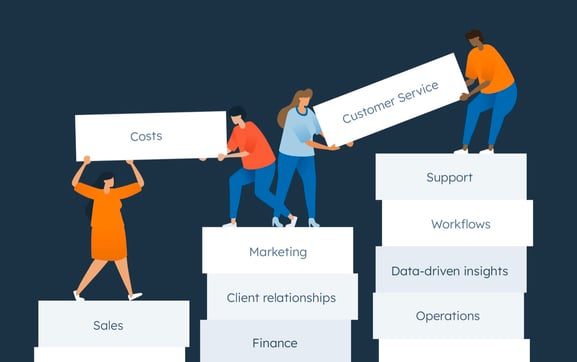
London, May 16, 2022 (GLOBE NEWSWIRE) — Technical search engine optimisation (SEO) essentially forms the foundation of your SEO strategy – without it, all efforts fall apart. In short, technical SEO helps your website get crawled and indexed by search engines, which helps drive more traffic to it and keep users there for longer.
To ensure success, it’s important to optimise your website to not only be fast, but also user-friendly and functional. Although technical SEO isn’t as time-consuming as other ongoing optimisation, i.e., link building, getting it wrong can have a detrimental effect on your website in terms of search rankings. So, you might ask – what are the benefits of Technical SEO? In this post, we discuss some key elements, and why they’re important.
1. It helps achieve better rankings
Technical SEO helps to improve your website’s ranking for your target search keywords and phrases, helping you drive more traffic to your landing pages. With a clear website structure, Google can clearly index and display content efficiently, which will help support and improve your organic rankings.
In the same vein, Google highly favours the improvement of page speed. By ensuring web pages load quickly, those pages will be favoured much greater than competitor sites that have not considered page speed as a key ranking factor. Overall, technical SEO can support site conversions, and can help you identify and resolve any roadblocks that prevent users from navigating through the site and enable us to amend them to achieve the best CRO results.
2. Improves page speed
Page speed is considered a significant ranking factor by Google, and to improve it, technical SEO is key. A fast loading website is more likely to get a better search ranking, and having a poor performing site will only increase the bounce rate, which will result in fewer conversions.
However, there are other factors that contribute towards a poor performing website: images that are not well optimised, lack of content compression, pages with too many CSS image requests, and complicated page templates with too many plugins. By having a quicker loading site, you will shoot up in the ranking via Google.
Through the implementation of structured data/schema mark-up, we can signal to search engines in more detail what a page is about, gain rankings and expose more effectively (through rich snippets, for example). In addition, the use of mobile is surpassing desktop for browsing search engines, so having a mobile friendly, technically sound website will help support user experience on mobile. Google gives clear messages that having a responsive website is an important ranking signal by its algorithms, so having a flexible website is more important than ever due to Google’s mobile-first strategy to indexing information.
There are a few things that can be done to ensure your website loads faster. This includes using fast hosting, minimising HTTP requests and using multiple CSS style sheets. Ensure to reduce the size of your image files as much as possible, and compress your web pages by getting rid of unnecessary spaces, line breaks, or indentations in your HTML, CSS and JavaScript.
3. Helps eliminate duplicate content
Are you using canonical URLs? Canonicalisation is the best way to eliminate duplicate content in URL. It’s the process of choosing a preferred URL when there are several choices for an individual page. You want to avoid duplicate content. Through regular technical audits, we can mitigate risks of duplicate content.
If you have the same content on multiple pages of your site, then the search engine will penalise the site. To avoid duplication, you need to differentiate one page from the other using the heading tags, title, and meta description.
Different URLs can show the same content due to technical reasons, and you won’t even know the issue exists. For a visitor, this doesn’t make any difference, but for the search engine, it will see the same content on a different URL. With the Yoast SEO plugin, you can easily set a canonical URL for each page. And, to make it easier, Yoast SEO also adds self-referencing canonical links to all your pages. This will help prevent duplicate content issues that you otherwise might not have been aware of. There is also a possibility that you can have duplicate content from another website. Unfortunately, the bots can’t figure out who plagiarised, so Google will penalise both of you.
4. You can set up structured data
Structured data is important to your website, especially in terms of performance. In short, structured data mark-up is the code you add to your website to help search engines better understand the content. This information can assist search engines in better indexing your site and providing more relevant results. Structured data also enhances search results by providing “rich snippets”; for example, structured data may be used to add star ratings to reviews. Because they’re more visually appealing and immediately highlight useful information for searchers, these enhanced results can increase your clickthrough rate (CTR) and bring additional traffic to your site. It’s worth the effort to add structured data to your site, as sites with higher CTRs are generally considered to be more favoured by search engines.
5. Helps locate website structure issues
Another important factor to consider is internal links to deep pages. Pages should ideally be no more than three clicks deep within your site. If this is the case, you’ll need to devote some effort to flattening the structure of your website. It’s as basic as the fact that the deeper a page gets, the less likely it is to be found by people or search engines. Pages that need more than three clicks to access will be marked in the problems section of your site audit report.
In addition, it’s important to validate your XML sitemaps. An XML Sitemap is a file that details all of your website’s pages and articles. It includes the titles, as well as the release date and the most recent update date. When crawling a website, search engines might utilise the XML sitemap as a guide.
Hopefully this guide has helped you to understand the benefits of technical SEO. If you need more personalised support, you can get in touch with SEO specialists here.
About The Brains
The Brains is a leading digital marketing agency in London, focused on strategies that offer unbeatable ROI and long-term business success. The Brains offers SEO, content marketing, lead generation and PPC services among others.
CONTACT: The Brains 86-90 Paul Street London London EC2A 4NE United Kingdom 0333 050 7328 https://thebrainsmarketing.co.uk/






More Stories
WordPress Maintenance: Tips for WordPress Website Maintenance
What Makes a Good Website?
Websites For CPAs & Accountants To Effectively Market Accounting Services